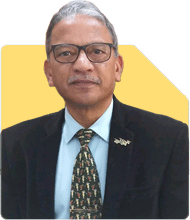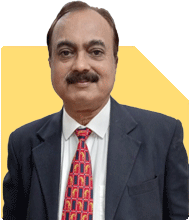R P Yadav | Answer |Ask -Follow
HR, Workspace Expert - Answered on Mar 13, 2023
Over the years, he has been the recipient of numerous awards including the Lifetime Achievement Award from World HR Congress and HR Person Of The Year from Public Relations Council of India.
... more

Dear sir, Q. What are the the most important things that an employee should take care of so that his/her boss doesn't get annoyed ? Q. What are the characteristics of growth in life ?
You may like to see similar questions and answers below
Mayank Rautela | Answer |Ask -Follow
HR Expert - Answered on Aug 17, 2021
Amit Bansal | Answer |Ask -Follow
Answered on Jun 18, 2010
Nitin Sathe | Answer |Ask -Follow
HR, Recruitment Expert - Answered on Mar 10, 2023
Anu Krishna |1746 Answers |Ask -Follow
Relationships Expert, Mind Coach - Answered on Mar 14, 2023
Pradeep Pramanik | Answer |Ask -Follow
Career And Placement Consultant - Answered on Sep 19, 2024
Anu Krishna |1746 Answers |Ask -Follow
Relationships Expert, Mind Coach - Answered on Dec 08, 2025
Ramalingam Kalirajan |10874 Answers |Ask -Follow
Mutual Funds, Financial Planning Expert - Answered on Dec 08, 2025
Samraat Jadhav |2499 Answers |Ask -Follow
Stock Market Expert - Answered on Dec 08, 2025
Ramalingam Kalirajan |10874 Answers |Ask -Follow
Mutual Funds, Financial Planning Expert - Answered on Dec 08, 2025
Radheshyam Zanwar |6737 Answers |Ask -Follow
MHT-CET, IIT-JEE, NEET-UG Expert - Answered on Dec 08, 2025
Nayagam P P |10852 Answers |Ask -Follow
Career Counsellor - Answered on Dec 07, 2025

Research Career Prospects: IISc, IITs, and Beyond: For research-oriented careers, the Integrated M.Sc Physics program at Amrita provides an exceptional foundation. Amrita's curriculum specifically aligns with GATE and UGC-NET examination syllabi, and the institution emphasizes early research engagement. The faculty at Amrita actively publish research in Scopus-indexed journals, with over 60 publications in international venues within the past five years, exposing you to active research environments.
To pursue research at premier institutions like IISc, you would typically follow the PhD pathway. IISc accepts M.Sc graduates through their Integrated PhD programs, and with your Amrita M.Sc, you're eligible to apply. You'll need to qualify the relevant entrance examinations, and your integrated program's emphasis on research fundamentals provides strong preparation. The final year of your Integrated M.Sc is intentionally structured to be nearly free of classroom commitments, enabling engagement with research projects at institutes like IISc, IITs, and National Labs. According to Amrita's data, over 80% of M.Sc Physics students secured internship offers from reputed institutions during academic year 2019-20, directly facilitating research career transitions.
Placement and Direct Employment Opportunities: Amrita University boasts a comprehensive placement ecosystem with strong corporate and government sector connections. According to NIRF placement data for the Amrita Integrated M.Sc program (5-year), the median salary in 2023-24 stood at ?7.2 LPA with approximately 57% placement rate. However, these figures reflect general placement trends; physics graduates often secure higher packages in specialized technical roles. Many graduates join software companies like Infosys (with early offers), Google, and PayPal, where their strong analytical and computational skills command competitive compensation packages ranging from ?8-15 LPA for entry-level positions.
The Department of Corporate and Industrial Relations at Amrita provides intensive three-semester life skills training covering linguistic competence, data interpretation, group discussions, and interview techniques. This structured placement support significantly enhances your employability in both government and private sectors.
Government Sector Opportunities: UPSC, BARC, DRDO, and ISRO: Your M.Sc Physics degree opens multiple avenues for prestigious government employment. UPSC Geophysicist examinations explicitly list M.Sc Physics or Applied Physics as qualifying degrees, enabling you to compete for Group A positions in the Geological Survey of India and Central Ground Water Board. The age limit for geophysicist positions is 32 years (with relaxation for reserved categories), and the exam comprises preliminary, main, and interview stages.
BARC (Bhabha Atomic Research Centre) actively recruits M.Sc Physics graduates as Scientific Officers and Research Fellows. Recruitment occurs through the BARC Online Test or GATE scores, with positions in nuclear science, radiation protection, and atomic research. BARC Summer Internship programs are available, offering ?5,000-?10,000 monthly stipends with opportunity for future scientist recruitment.
DRDO (Defense Research and Development Organization) recruits M.Sc Physics graduates through CEPTAM examinations or GATE scores for roles involving defense technology, weapon systems, and laser physics research. ISRO (Indian Space Research Organisation) regularly advertises scientist/engineer positions through competitive recruitment for candidates with strong physics backgrounds, offering opportunities in satellite technology and space science applications.
Other significant employers include the Indian Meteorological Department (IMD) recruiting as scientific officers, and NPCIL (Nuclear Power Corporation of India Limited), offering stable government service with competitive compensation packages exceeding ?8-12 LPA for scientists.
Alternate Career Pathways: UPSC, CDS, and AFCAT: UPSC Civil Services (IFS - Indian Forest Service): M.Sc Physics graduates qualify for UPSC Civil Services examinations, with the forest service offering opportunities for science-based administrative roles with potential to reach senior government positions.
CDS/AFCAT (Armed Forces): While AFCAT meteorology branches specifically require "B.Sc with Maths & Physics with 60% minimum marks," the technical branches (Aeronautical Engineering and Ground Duty Technical roles) require graduation/integrated postgraduation in Engineering/Technology. An M.Sc Physics integrates well with technical qualifications, though you would need engineering background for direct officer entry. However, you remain eligible for specialized technical interviews if applying through alternate defence channels.
UGC-NET Examination: This pathway leads to Assistant Professor positions in central universities and colleges across India. NET-qualified candidates receive scholarships of ?31,000/month for 2-year JRF positions with PhD pursuit, transitioning to Assistant Professor salaries of ?41,000/month in government institutions. This route provides long-term academic career security with research opportunities.
Private Sector Technical Roles
M.Sc Physics graduates are increasingly valued in data science, software engineering, and technical consulting. Companies actively recruit physics graduates for software development, where strong problem-solving and logical reasoning translate to competitive packages of ?10-20 LPA. Specialized domains including quantum computing development, financial modeling, and scientific computing offer premium compensation. Your minor in Scientific Computing makes you particularly attractive to technology companies requiring computational expertise.
International Opportunities and Higher Studies Abroad
An M.Sc from Amrita facilitates admission to PhD programs at international institutions. German universities offer tuition-free or low-fee MSc Physics programs (2 years) with scholarships like DAAD providing €850+ monthly stipends. US universities accept M.Sc graduates directly for PhD positions with full funding (tuition coverage + stipend). These pathways require GRE scores and strong Statement of Purpose articulating research interests. Research collaboration opportunities exist with Max Planck Institute (Germany) and CalTech Summer Research Program (USA), both welcoming Indian M.Sc students.
Essential Skills and Certifications to Develop Immediately: Programming Languages: Start learning Python immediately—it's universally used in research and industry. Dedicate 2-3 hours weekly to data analysis, scientific computing libraries (NumPy, SciPy, Pandas), and machine learning fundamentals. MATLAB is equally critical for physics applications, particularly numerical simulations and data visualization. Aim to complete MATLAB certification courses within your first year.
Research Tools: Learn Git/version control, LaTeX for scientific documentation, and data analysis frameworks. These skills are indispensable for publishing research papers and collaborating on projects.
Certifications Worth Pursuing: (1) MATLAB Certification (DIYguru or MathWorks official courses) (2) Python for Data Science (complete certificate programs from platforms like Coursera) (3) Machine Learning Fundamentals (for expanding technical versatility) & (4) Scientific Communication and Technical Writing (develop through departmental workshops)
Strategic Internship Planning: Leverage Amrita's research connections systematically. In your third year, apply to BARC Summer Internship, IISER Internships, TIFR Summer Fellowships, and IIT Internship programs (like IIT Kanpur SURGE). These expose you to frontier research while establishing connections for future PhD or scientist recruitment. Target 2-3 research internships across different specializations to develop versatility.
TO SUM UP, Your Integrated M.Sc Physics degree from Amrita positions you exceptionally well for competitive research careers at IISc/IITs, prestigious government scientist roles at BARC/DRDO/ISRO, and international PhD opportunities. The program's scientific computing emphasis differentiates you in the job market. Immediate priorities: (1) Master Python and MATLAB within the first two years; (2) Engage in research projects starting year 2-3; (3) Target internships at premiere research institutions; (4) Prepare GATE while completing your degree for maximum flexibility in recruitment; (5) Consider UGC-NET for long-term academic stability. Your career trajectory will ultimately depend on developing strong research fundamentals, demonstrating consistent excellence in specialization areas, and strategically selecting internship and research opportunities. The rigorous Amrita program combined with disciplined skill development positions you for exceptional career success across multiple sectors. Choose the most suitable option for you out of the various options available mentioned above. All the BEST for Your Prosperous Future!
Follow RediffGURUS to Know More on 'Careers | Money | Health | Relationships'.
Nayagam P P |10852 Answers |Ask -Follow
Career Counsellor - Answered on Dec 07, 2025
Radheshyam Zanwar |6737 Answers |Ask -Follow
MHT-CET, IIT-JEE, NEET-UG Expert - Answered on Dec 06, 2025

Good luck.
Follow me if you receive this reply.
Radheshyam
Dr Nagarajan J S K |2576 Answers |Ask -Follow
NEET, Medical, Pharmacy Careers - Answered on Dec 06, 2025
Mihir Tanna |1090 Answers |Ask -Follow
Tax Expert - Answered on Dec 06, 2025































